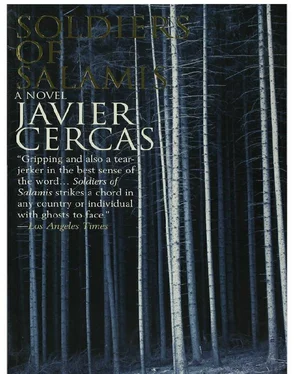Paralyzed by terror, a man with a bereft look and travelling clothes tried to answer, but only succeeded in breaking the solid silence following the question with an indecipherable burbling, while reaching a desperate hand, claw-like, into his jacket pocket. Standing in front of him, Sánchez Mazas wanted to know if he were related to the brothers Pedro and Joaquin Figueras. 'I'm their father,' he managed to articulate with a strong Catalan accent and frantic nodding that didn't abate even when Sánchez Mazas crushed him in a relieved embrace. After the effusive greetings, the two men chatted for a few minutes in the office. Joaquim Figueras recounted that his son Pere had spent the last month and a half in prison in Gerona, groundlessly accused, along with other young men of the village, of taking part in the burning of the Cornellá de Terri church at the beginning of the war and of having been involved in the murder of the Municipal Secretary. Sánchez Mazas didn't let him finish; he left his office through a side door and came back a few moments later.
'That's settled,' he proclaimed. 'When you get back to Cornellá you'll find your son at home.'
Figueras left the office in a euphoric state. On his way down the steps he noticed a piercing pain in his hand and realized he still had it thrust inside his jacket pocket, clutching, with all his strength, a piece of paper torn out of a notebook with green covers where Sánchez Mazas had recorded his debt of gratitude to Figueras' sons. And when he arrived in Cornellá days later and dry-eyed embraced his recently freed son, Joaquim Figueras knew he hadn't been wrong to undertake that hallucinatory trip across a devastated country to see a man he didn't know and whom he'd consider till the end of his days one of the most powerful men in Spain.
He was only partly mistaken. Although he'd always considered it an occupation unworthy of gentlemen, Sánchez Mazas had by then spent more than a decade in politics and would take another few years to leave it, but never in his whole life was he to accumulate so much real power in his hands as right then.
He'd been born in Madrid on 18 February, forty-five years earlier. His father, a military doctor originally from Coria, whose uncle had been royal physician to Alfonso XII, died a few months later, and his mother, Maria Rosario Mazas y Orbegozo, immediately sought the protection of her family in Bilbao. There, in a five-storey house beside the Deusto Bridge, on Henao Street, cajoled by an army of childless uncles, he spent his childhood and adolescence. The Mazas were a clan of hidalgos of liberal traditions and literary inclinations, related to Miguel de Unamuno and solidly anchored in the cream of Bilbao society, from which Sánchez Mazas drew inspiration to construct a few characters for his novels, and from whom he inherited an irrepressible propensity to lordly idleness and an obstinate literary vocation. The latter had once similarly tempted his mother, a clever, illustrious woman who poured all her untimely widow's energy into facilitating her son's career as a writer, a career she herself hadn't wanted or been able to pursue.
Sánchez Mazas didn't let her down. It's true he was a mediocre student, who wandered through various upper-class Catholic boarding schools with more shame than glory before ending up at the Central University of Madrid, and finally the Augustinian Maria Cristina Royal College for Advanced Studies at the monastery in El Escorial, where in 1916 he graduated in Law. It's equally true, however, that he began to show obvious signs of literary talent quite early. At the age of thirteen he wrote poems in the styles of Zorrilla and Marquina; at twenty he imitated Rubén Darío and Unamuno; by twenty-two he was a mature poet; at twenty-eight his poetic work was essentially complete. With typical aristocratic disdain, he barely bothered to publish them, and if we know his work in its entirety (or almost) it's largely owing to the vigilance of his mother, who transcribed his poems by hand in small notebooks bound in black oilcloth, recording beneath each one its place and date of composition. Moreover, Sánchez Mazas is a good poet; a good minor poet, I mean, which is about all a good poet can aspire to. His verses have only one chord — humble and ancient, monotonous and a bit sentimental — but Sánchez Mazas plays it masterfully, drawing from it a clean, natural, prosaic music that can only be sung by the bittersweet melancholy of time that flees and in its flight drags down order and the reliable hierarchies of an abolished world that, precisely because it is abolished, is also an invented, impossible world, almost always equivalent to the impossible, invented world of Paradise.
Although he published only one book of poems in his lifetime, it's possible that Sánchez Mazas always considered himself a poet, and perhaps that's what he essentially was; his contemporaries, however, knew him primarily as the author of chronicles, articles and novels, and especially as a politician, which is exactly what he never considered himself and perhaps what he never essentially was. In June of 1916, a year after publishing his first novel, Brief Memoirs of Tarín, and having recently graduated in law, Sánchez Mazas returned to Bilbao, then a headstrong, self-satisfied city, dominated by a buoyant bourgeoisie enjoying a period of economic splendour derived from Spain's neutrality during the First World War. That bonanza found its most conspicuous cultural expression in the magazine Hermes, which drew together a handful of Catholic writers, admirers of Eugenio d'Ors, Spanish nationalists, devotees of Roman culture and the values of western civilization, whom Ramón de Basterra baptized with the pompous title, 'Roman School of the Pyrenees'. Basterra was one of the more notorious members of that group of writers, the majority of whom would in time go on to swell the ranks of the Falangists; another was Sánchez Mazas. They would meet for discussions at the Lyon d'Or, a cafe located in the middle of Gran Via de López de Haro, where Sánchez Mazas dazzled, as a cultivated, circumspect and rather bombastic conversationalist. José Maria de Areilza, then a boy, whose father took him to the Lyon d'Or for hot chocolate, remembers him as 'a tall and very thin young man, with tortoiseshell spectacles, his eyes both ardent and weary, with a voice which sometimes became strident when emphasizing some point in an argument'. At that time Sánchez Mazas was already writing assiduously in the newspapers ABC, El Sol, and El Pueblo Vasco, and in 1921 Juan de la Cruz, editor of the latter, sent him as a correspondent to cover the war in Morocco, where he began a lasting friendship of drinking sessions and long nocturnal conversations — which would withstand the rancour of living through a war on opposite sides — with another correspondent from Bilbao called Indalecio Prieto.
Sánchez Mazas' stay in Morocco lasted barely a year, because in 1922 Juan Ignacio Luca de Tena sent him to Rome as ABC's correspondent. He was fascinated by Italy. His youthful passion for classical culture, for the Renaissance, and Imperial Rome were forever crystallized by contact with Rome itself. He lived there for seven years. There he married Liliana Ferlosio, an Italian recently emerged from adolescence whom he practically carried off from her home and with whom he would maintain for the rest of his life a chaotic relationship which produced five children. There he matured as a man and as a writer. There he gained a deserved reputation as a columnist by way of some very literary articles, sophisticated in style and confidently executed — sometimes dense with erudition and lyricism, sometimes vehement with political passion — that are perhaps the best of his work. There, too, he was converted to fascism. In fact, it would not be an exaggeration to claim Sánchez Mazas as Spain's first fascist, and quite correct to say he was its most influential theoretician. Fervent reader of Maurras and intimate friend of Luigi Federzoni who incarnated in Italy a kind of enlightened, bourgeois fascism, and in the fullness of time would come to hold various ministerial posts in Mussolini's governments — monarchical and conservative by vocation, Sánchez Mazas thought he'd discovered in fascism the ideal instrument to cure his nostalgia for an imperial Catholicism and, especially, to forcibly mend the reliable hierarchies of the ancien regimé that the old democratic egalitarianism and the vigorous, new Bolshevik egalitarianism were threatening to annihilate all over Europe. Or to put it another way: perhaps for Sánchez Mazas fascism was simply a way of realizing his poetry, of making real the world it melancholically evoked the abolished, invented, impossible world of Paradise. Be that as it may, the fact is he greeted the March on Rome enthusiastically in a series of articles entitled Italy's Genteel Transition, and saw Benito Mussolini as the reincarnation of the Renaissance condottiere and his ascension to power as the proclamation that the time of heroes and poets had returned to Italy.
Читать дальше












